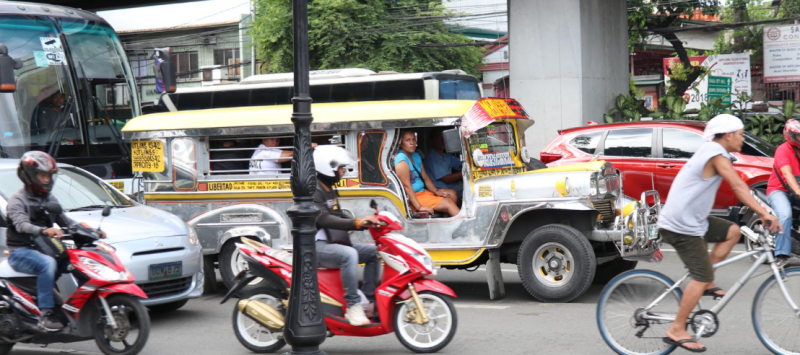

As the world enters in a new Decade of Action for Road Safety 2021-2030, the UN Road Safety Fund (UNRSF) announces the successful completion of two of pilot projects demonstrating the potential of targeted and coordinated action to save lives in low- and middle-income countries, where 90% of the 1.35 million annual road fatalities occur.
“We have a unique opportunity to unlock safe mobility to drive a sustainable COVID-19 recovery and to tackle a crisis that needlessly claims the lives of more than 500 children every day.- I call on all governments, the private sector and all stakeholders to massively scale up political commitment and mobilization of resources. Contributing to the UN Road Safety Fund can save lives”, urged the UN Secretary-General’s Special Envoy for Road Safety, Jean Todt.
The first UNRSF project completed, "Child-responsive urban planning and sustainable urban transportation", was implemented by the United Nations Children's Fund (UNICEF) in Paraguay and in the Philippines. It has developed a sustainable model school showing that child responsive urban planning and engineering interventions can reduce the number of fatalities and injuries.
According to WHO data, 12.3 per 100,000 people die from road crashes in the Philippines and 22.7 per 100,000 people in Paraguay. Children are among the most vulnerable road users. Jen Aerts, Urban design specialist for UNICEF in Paraguay, said "We built this project to raise confidence and give arguments to choose who build cities to put children at the center". By mobilizing national authorities to design better policies for road safety, the Fund supported Paraguay's Ministry of Housing and Urban Planning to issue a directive ensuring that all future urban development projects take child rights into consideration. This includes National universities integrating the project's model school zones in civil engineering and architecture programmes.
In the Philippines, the project goal was to "support the Government to reduce child road traffic deaths through research, advocacy, coalition-building and modernizing school zones", said Angelito Umali, Health Officer and Program Manager, Child Road Traffic Injury Prevention Program. Through the project, more than 215 practitioners and stakeholders (Government officials, urban planners, engineers, private sector actors, local government representatives, etc.) have been trained in child responsive urban planning.
No child should die or be seriously injured while they walk, go to school, cycle or play.
"Road crashes are the leading cause of death for children and young adults aged 5–29 years, devastating families and communities and jeopardizing the development of entire nations. This is unacceptable", stressed Olga Algayerova, Executive Secretary of the UNECE, the custodian of the UN Conventions on Road Safety. “The UN Road Safety Fund shows how we can save lives by working together to address critical gaps to ensure roads are safe for everyone, everywhere. This is a human rights imperative".
The 2020 UN Resolution on improving global road safety urges UN Member States to take action to protect children and youth among the most vulnerable road users. No child should die or be seriously injured while they walk, go to school, cycle or play.
Triggering domestic and international investments to ensure impact far beyond the grants
The second project "Strengthening Speed Management in the Philippines" was implemented by the UN Economic and Social Commission for Asia and the Pacific (UNESCAP), the Global Road Safety Partnership (GRSP) and Imagine Law, a Philippines-based non-governmental organization.
While the level of traffic deaths is lower in the Philippines (12.3 per 100,000 people) than the average for the Western Pacific Region of 16.9 deaths per 100,000 population, and at similar level to countries like USA (12.4 per 100,000) or Chile (12.5 per 100,000), the country is stepping up measures to improve its road safety situation.
The UNRSF project trained more than 170 speed enforcers in best-practice speed enforcement, supported high-level officials in developing speed enforcement plans, and raised awareness among more than 75,000 people through social media engagement on the importance of appropriate speeds.
A speed enforcement package has been developed ensuring the sustainability of the speed management training through “Train the Trainer” workshops. The UNRSF seeks to use its funding in a catalytic way, leveraging its unique position as a United Nations fund to trigger further domestic and international investments, thus ensuring an impact far beyond its own grants. "As we move forward, we commit to continuously support the national government towards a Philippines with zero road deaths by assisting the Land Transportation Office in migrating the enforcement trainings to a digital platform", said Sophia San Luis, the Executive Director of Imagine Law.
As for all the UNRSF projects, lasting impact was a key priority, by ensuring the capacity of the national authorities to continue to conduct speed management training beyond the completion of the pilot project. Guided by the safe system principles embedded in its Global Framework Plan of Action for Road Safety, the Fund will ensure effective and coordinated investment in what works best and has tangible impacts for road safety.
After two and a half years since its establishment and three Calls for proposals, the UNRSF is currently financing 15 projects, covering 4 regions, in 19 countries, ranging from improving infrastructure for active mobility, capacity building, policy and law enforcement to strengthening data collection systems. The UNRSF currently receives contributions from the public sector, including Russian Federation, France, the European Commission, The Kingdom of Bahrain, Monaco, Hungary, Slovakia, Cyprus and Mauritius, and from private sector companies such as FIA Foundation, Total Foundation, Michelin, Pirelli, 3M and Essilor.
The geographical and programmatic footprint of the Fund is set to grow with the 2020 Call for Proposals which closed in January 2021. The call will disburse USD 4 million to support projects with significant and sustainable impact in low- and middle-income countries. It will encourage complementarity between road safety partners, promote interconnection with other SDGs challenges and will be partially connected with COVID-19 measures.
Originally published on https://roadsafetyfund.un.org